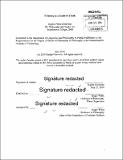Evidence as a guide to truth
Author(s)
Horowitz, Sophie Pilloo
DownloadFull printable version (5.488Mb)
Other Contributors
Massachusetts Institute of Technology. Department of Linguistics and Philosophy.
Advisor
Roger White.
Terms of use
Metadata
Show full item recordAbstract
Any non-skeptical epistemological theory should hold that, if we want to know what the world is like, our best bet is to believe what our evidence supports. Evidence is a guide to truth. Though it might sound like a platitude, this thesis is far from trivial. My dissertation defends and develops a more complete picture of what our epistemological theory should look like, given this anti-skeptical thesis. If evidence is a guide to truth, we should expect that our beliefs about what our evidence supports should line up with our beliefs about the world. But this idea has come under fire in recent literature. In the first chapter, "Epistemic Akrasia", I argue that it is irrational to believe both P and my evidence does not support P. I show that epistemic akrasia licenses bad reasoning and irrational action. The second chapter "Immoderately Rational", brings out a surprisingly strong implication of the thesis. I argue that we can defend the thought that evidence is a guide to truth only if we have an extremely impermissive view, on which there is just one ideally rational response to any body of evidence. Even moderately permissive views cannot give this answer. In the third chapter, "Immodesty and Educated Guesses", I step back to consider how degrees of belief, or credences, can "get things right", given that they cannot be true or false. I defend a novel alternative: credences get things right by licensing true "educated guesses". The idea is that an agent's credences license all-or-nothing verdicts, which can be elicited in forced choice scenarios; credences get things right to the extent that these all-or-nothing verdicts tend to be true. This account vindicates a popular and plausible thought that rational credence is stable: if you know your credences are rational, you should not want to change them without receiving new evidence. I also suggest that it can be used to argue for probabilistic coherence as a rational requirement.
Description
Thesis: Ph. D. in Philosophy, Massachusetts Institute of Technology, Department of Linguistics and Philosophy, 2014. Cataloged from PDF version of thesis. Includes bibliographical references (pages 93-96).
Date issued
2014Department
Massachusetts Institute of Technology. Department of Linguistics and PhilosophyPublisher
Massachusetts Institute of Technology
Keywords
Linguistics and Philosophy.